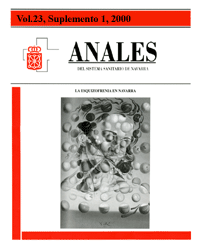Schizophrenia in Navarra. An historical perspective
Keywords:
Esquizofrenia. Historia. Hospitalización. Morbilidad. Drogadicción .Abstract
Following a brief outline of data relating to the care of the ímadî in the XIX century in Navarra, this study focuses on the ideas and contributions made by psychiatrists over the course of the XX century and especially those of the Psychiatric Hospital, the only care resource until well after the first half of the century. An analysis is made of the factors that are usually considered to have influenced the notable reduction in the rate of first-time hospitalisations for schizophrenia: progressive longevity; change of diagnostic criteria; increase of suicides in young people; reduction of perinatal infections. We conclude that the latter, although certainly limited, is the only factor of objective value. In general, the procedure based on first-time hospitalisations cannot be considered as a valid indicator of the real decline in morbidity, since it is highly influenced by the changes of criteria deriving from the greater wealth of therapeutic possibilities. Sociological, evolutionary and therapeutic aspects of schizophrenic patients interned in the Navarra Psychiatric Hospital are shown. A study is made of the association between drug addiction and schizophrenia, and we reach the conclusion that this does not increase its incidence but that it does accelerate the first onset. Finally, we consider the need for imaginatively filling the gap created by the "bipartisanship"in mental health between the hospitalisation of acute cases in general hospitals and the support of social care.Downloads
Downloads
Published
How to Cite
Issue
Section
License
La revista Anales del Sistema Sanitario de Navarra es publicada por el Departamento de Salud del Gobierno de Navarra (España), quien conserva los derechos patrimoniales (copyright ) sobre el artículo publicado y favorece y permite la difusión del mismo bajo licencia Creative Commons Reconocimiento-CompartirIgual 4.0 Internacional (CC BY-SA 4.0). Esta licencia permite copiar, usar, difundir, transmitir y exponer públicamente el artículo, siempre que siempre que se cite la autoría y la publicación inicial en Anales del Sistema Sanitario de Navarra, y se distinga la existencia de esta licencia de uso.








